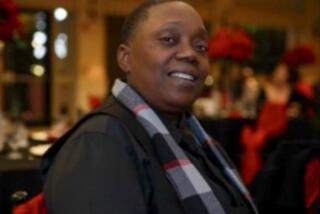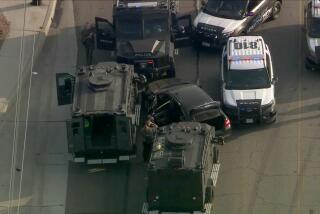Guns Fall Silent After Boy’s Death in Projects
CHICAGO — Life at the notorious Cabrini-Green public housing project has changed in the month since a 7-year-old boy was killed as he walked to school with his mother.
Residents now fall asleep to the sound of silence instead of gunfire. Children have returned to playgrounds once conceded to gangs. The gangs themselves have declared a truce--which may be holding.
“It’s strange to see kids out there actually playing,” marveled Rashina Bell, one of 7,000 people who call Cabrini-Green home.
Dantrell Davis was killed on the morning of Oct. 13 by a sniper shooting from the 10th-floor window of a vacant Cabrini apartment.
Anthony Garrett, 33, was charged with Dantrell’s killing and ordered held without bond. Police say Garrett, a marksman who learned to shoot in the military, told officers he was aiming at teen-age gang members he believed had been shooting at his building.
Dantrell was the third student from his school killed this year.
His death seemed to galvanize the city to finally do something to stem the violence at Cabrini-Green, a sprawling complex of 23 high rises and 60 row houses in the city’s North Side.
One city official even suggested calling in the National Guard, a step that wasn’t taken.
Mayor Richard M. Daley announced a police sweep to confiscate drugs and weapons. Metal detectors and stringent security systems were installed in the high-rises, requiring residents to meet guests at the door and escort them to their apartments.
Four buildings, including the one from which Dantrell was shot, are being closed permanently. Police say gangs and other criminals used vacant apartments there to conduct illicit business.
Police also have increased their numbers significantly at Cabrini, but won’t say how many officers are there.
Leaders of 12 street gangs declared a truce.
Residents describe the silence of the night, once punctuated by gunfire.
“It would end about 6 o’clock in the morning,” said Lillian Davis Swope, 62, a 39-year Cabrini resident. “No one seemed to be able to stop it.”
Police report no shootings at the complex since Dantrell was killed.
“It’s been very, very quiet here,” said Sgt. Bernard Ward, of the police unit at Cabrini. “I’ve been here 10 years and I’ve never seen it like this.”
The increased security is not without its drawbacks.
Some say the housing sweeps, the identification cards residents are now required to wear and the sight of police at every turn are dehumanizing reminders of lives already scarred by poverty.
“It may be safer, but it’s a prison mentality,” said Julia Burgess, director of Demicco Services, a Cabrini social services agency. “Everybody wants to live in a safe environment. But living with it every day, they don’t like a lot of aspects of it.”
In 1981, after years of bloody gang warfare at the project, then-Mayor Jane Byrne moved in for three weeks to dramatize her cleanup effort. But the violence returned when the city turned its attention elsewhere.
This time, Peery said, “people are hoping it lasts.”
More to Read
Sign up for Essential California
The most important California stories and recommendations in your inbox every morning.
You may occasionally receive promotional content from the Los Angeles Times.










